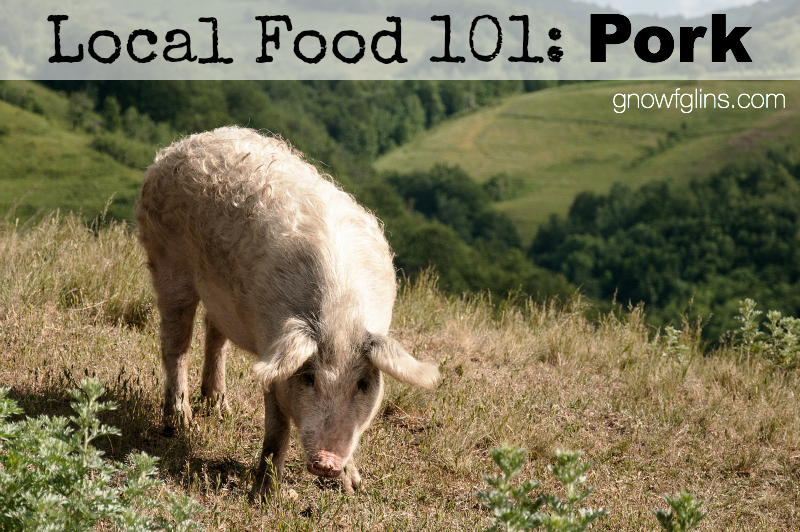
Knowing your food and your farmer. We talk about this, but why is it important? So you can support farmers who practice sustainable agriculture that improves the land, soil, and animal health; to provide healthy nourishment for your and your family; and ultimately to glorify our Creator through our recognition and pursuit of food systems that honor His design.
But how can you know if a particular food source is a wise and healthy choice? You start by talking to the farmer who produces it, asking questions that pertain to the type of food you’re buying.
This is the Local Food 101 series, where we’ll cover types of local food, along with the particular questions you can ask to determine the quality of the food being offered. We have already covered chickens and eggs, beef, fruits and vegetables, and herbs.
In this post we’ll talk about pigs and how to get good quality pork!
Living Conditions
How are the pigs raised?
Pigs in factory farms live in unbelievably horrible conditions that are filthy, cruel, and unsafe. You can read about factory pig farms here if you’d like more information, but I’ll refrain from the graphic details in this post.
Ideally, pigs should have access to forest where they can forage for nuts and acorns. Pigs have a plow on the end of their nose with which to dig, and good farms will honor this.
Joel Salatin of Polyface Farms allows his pigs to root in forests and also uses them to turn his compost each spring as they dig for fermented corn purposely buried in it. Different farms may use pigs differently — some use them to turn up garden beds for instance — but the point is that they have the opportunity to act like pigs.
In addition to this, pigs should also be provided a place to cool off, such as a stream or mud to wallow in as they are unable to sweat.
Food
What are the pigs fed?
Pigs are natural omnivores and will eat a wide variety of foods. Pigs should be allowed to forage on pasture that is not chemically treated. Grain is often necessary for fattening, but it should be absolutely non-GMO and preferably organic. Pigs may eat table scraps, which is acceptable as long as the scraps are healthy and not laced with additives and preservatives.
Nitrates
Sodium nitrate and sodium nitrite are preservatives traditionally used to slow-cure salted, aged, fermented and/or smoked meats — they prevent botulism and help the meat maintain a red/pink color. Though they are often linked with cancer and pooh-poohed, some suggest the link with cancer has been debunked and that nitrates/nitrites many even be beneficial in the body.
Much commercially cured pork products are processed with nitrites, but not in a traditional way:
“Instead, manufacturers opt for fast and cheap methods by which inferior quality factory-farmed meat is pumped and plumped with a liquid cure solution that includes sodium erythrobate and sodium nitrite, along with “liquid smoke,” spices and flavorings heavy in MSG.
“Liquid smoke,” a product heavily favored by big food manufacturers, is produced by burning wood chips or sawdust, then condensing the smoke into solids or liquids and dissolving it in water. It is being investigated by the European Food Safety Authority for safety as a food flavoring because of evidence of genotoxicity and cytotoxicity. Indeed, one study suggests liquid smoke is more carcinogenic than cigarette smoke concentrate.” —Save Your Bacon! Sizzling Bits about Nitrites, Dirty Little Secrets about Celery Salt and Other Aporkalyptic News
On the other hand:
“The traditional way to make bacon is dry cured through hand rubbing with a mixture of herbs, sugars, salt, and the sodium nitrite curing salts. Vitamin C in the mix helps … give cured meats their wonderful red color, and … helps ensure nitrites convert to healthy nitric oxide and not carcinogenic nitrosamines.” —Save Your Bacon! Sizzling Bits about Nitrites, Dirty Little Secrets about Celery Salt and Other Aporkalyptic News
Please note: We see a modern trend to offer “uncured” meats using celery salt as the preservative agent. Be leery of this because even more nitrites are produced this way! You can read more about this in depth here.
At GNOWFGLINS, we feel that the traditional use of nitrate/nitrite curing salts is a beneficial ancestral practice that reduces the risk of bacterial contamination, or botulism.
This is an essential topic to bring up with your farmer to make sure you get safe, healthy meat.
Cost
Similar to other meats, purchasing in bulk at butchering time will often ensure the best deal. Some farms will give steep discounts if you pay in advance for large amounts. If you’re willing to take on odd parts, they may also offer discounts! 🙂
Do you have other tips to ensure your bacon is top quality? Be sure to share in the comments below!
...without giving up the foods you love or spending all day in the kitchen!

2 free books:
Eat God's Way
Ditch the Standard American Diet, get healthier & happier, and save money on groceries...
We only recommend products and services we wholeheartedly endorse. This post may contain special links through which we earn a small commission if you make a purchase (though your price is the same).


We just ate a Polyface pork butt this evening for dinner! Delicious! BUY LOCAL!
Thanks for the info about nitrates/nitrites. I had heard that but was somewhat confused about the whole thing. We have been interested in raising pigs at some point. We don’t have a forest but I had heard they were great little mini plows and would do a great job of tilling garden space. Meanwhile, I’d love to find some locally raised healthy pork. 🙂
I worked in a pig parlor for 5 years and we treated the animals very well. Not wanting to be negative but the hog in the photo has a coarse coat indicating worms. Pigs are very intelligent and comical animals and I really enjoyed taking care of them.
Thanks for posting about this. We’ve bought whole-cow before several times and have been interested in trying other meats. Pig, sheep, and goat are on our list. I wish you had included more info about actually finding a farmer, what time of year they are usually butchered, etc., but this was still helpful.